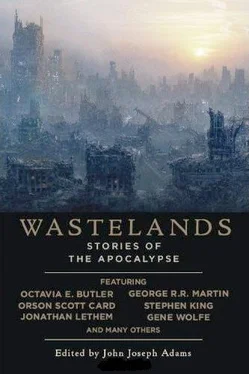Here, however, it seemed to have caught most folks at home in bed; as a result, the roads were more than usually passable.
At a loss-numb, really-Wyndham drove to work. He might have been in shock by then. He’d gotten accustomed to the smell, anyway, and the corpses of the night shift—men and women he’d known for sixteen years, in some cases—didn’t shake him as much. What did shake him was the sight of all the packages in the sorting area: He was struck suddenly by the fact that none of them would ever be delivered. So Wyndham loaded his truck and went out on his route. He wasn’t sure why he did it—maybe because he’d rented a movie once in which a post-apocalyptic drifter scavenges a US Postal uniform and manages to Re-Establish Western Civilization (but not the Bad Old Ways) by assuming the postman’s appointed rounds. The futility of Wyndham’s own efforts quickly became evident, however.
He gave it up when he found that even Monica—or, as he more often thought of her, the Home Shopping Network Lady—was no longer in the business of receiving packages. Wyndham found her face down on the kitchen floor, clutching a shattered coffee mug in one hand. In death she had neither a pretty face nor a nice personality. She did have that same ripe unpleasant door, however. In spite of it, Wyndham stood looking down at her for the longest time. He couldn’t seem to look away.
When he finally did look away, Wyndham went back to the living room where he had once watched nearly 3000 people die, and opened her package himself. When it came to UPS rules, the Home Shopping Network Lady’s living room was turning out to be something of a post-apocalyptic zone in its own right.
Wyndham tore the mailing tape off and dropped it on the floor. He opened the box. Inside, wrapped safely in three layers of bubble wrap, he found a porcelain statue of Elvis Presley.
#
Elvis Presley, the King of Rock ’n’ Roll, died August 16, 1977, while sitting on the toilet. An autopsy revealed that he had ingested an impressive cocktail of prescription drugs-including codeine, ethinamate, methaqualone, and various barbiturates. Doctors also found trace elements of Valium, Demerol, and other pharmaceuticals in his veins.
#
For a time, Wyndham comforted himself with the illusion that the end of the world had been a local phenomenon. He sat in his truck outside the Home Shopping Network Lady’s house and awaited rescue—the sound of sirens or approaching choppers, whatever. He fell asleep cradling the porcelain statue of Elvis. He woke up at dawn, stiff from sleeping in the truck, to find a stray dog nosing around outside.
Clearly rescue would not be forthcoming.
Wyndham chased off the dog and placed Elvis gently on the sidewalk. Then he drove off, heading out of the city. Periodically, he stopped, each time confirming what he had already known the minute he touched his dead wife’s face: The end of the world was upon him. He found nothing but non-functioning telephones, non-functioning televisions, and non-functioning people. Along the way he listened to a lot of non-functioning radio stations.
#
You, like Wyndham, may be curious about the catastrophe that has befallen everyone in the world around him. You may even be wondering why Wyndham has survived.
End-of-the-world tales typically make a big deal about such things, but Wyndham’s curiosity will never be satisfied. Unfortunately, neither will yours. Shit happens.
It’s the end of the world after all.
#
The dinosaurs never discovered what caused their extinction, either.
At this writing, however, most scientists agree that the dinosaurs met their fate when an asteroid nine miles wide ploughed into the Earth just south of the Yucatan Peninsula, triggering gigantic tsunamis, hurricane-force winds, worldwide forest fires, and a flurry of volcanic activity. The crater is still there, it’s 120 miles wide and more than a mile deep-but the dinosaurs, along with 75% of the other species then alive, are gone. Many of them died in the impact, vaporized in the explosion. Those that survived the initial cataclysm would have perished soon after as acid rain poisoned the world’s water and dust obscured the sun, plunging the planet into a years-long winter.
For what it’s worth, this impact was merely the most dramatic in a long series of mass extinctions; they occur in the fossil record at roughly 30-million-year intervals. Some scientists have linked these intervals to the solar system’s periodic journey through the galactic plane, which dislodges millions of comets from the Oort cloud beyond Pluto, raining them down on Earth. This theory, still contested, is called the Shiva Hypothesis in honour of the Hindu god of destruction.
#
The inhabitants of Lisbon would have appreciated the allusion on November 1, 1755, when the city was struck by an earthquake measuring 8.5 on the Richter Scale. The tremor levelled more than 12,000 homes and ignited a fire that burned for six days.
More than 60,000 people perished.
This event inspired Voltaire to write Candide, in which Dr. Pangloss advises us that this is the best of all possible worlds.
#
Wyndham could have filled the gas tank in his truck. There were gas stations at just about every exit along the highway, and they seemed to be functioning well enough. He didn’t bother, though.
When the truck ran out of gas, he just pulled to the side of the road, hopped down, and struck off across the fields. When it started getting dark—this was before he had launched himself on the study of just how it is night falls—he took shelter in the nearest house.
It was a nice place, a two-story brick house set well back from the country road he was by then walking on. It had some big trees in the front yard. In the back, a shaded lawn sloped down to the kind of woods you see in movies, but not often in real life: enormous, old trees with generous, leaf-carpeted avenues. It was the kind of place his wife would have loved, and he regretted having to break a window to get inside. But there it was: It was the end of the world and he had to have a place to sleep. What else could he do?
#
Wyndham hadn’t planned to stay there, but when he woke up the next morning he couldn’t think of anywhere to go. He found two non-functional old people in one upstairs bedroom and he tried to do for them what he had not been able to do for his wife and daughter: Using a spade from the garage, he started digging a grave in the front yard. After an hour or so, his hands began to blister and crack. His muscles—soft from sitting behind the wheel of a UPS truck for all those years—rebelled.
He rested for a while, and then he loaded the old people into the car he found parked in the garage—a slate-blue Volvo station wagon with 37,312 miles on the odometer. He drove them a mile or two down the road, pulled over, and laid them out, side-by-side in a grove of beech trees. He tried to say some words over them before he left-his wife would have wanted him to—but he couldn’t think of anything appropriate so he finally gave it up and went back to the house.
It wouldn’t have made much difference: Though Wyndham didn’t know it, the old people were lapsed Jews. According to the faith Wyndham shared with his wife, they were doomed to burn in hell for all eternity anyway. Both of them were first-generation immigrants; most of their families had already been burned up in ovens at Dachau and Buchenwald. Burning wouldn’t have been anything new for them.
#
Speaking of fires, the Triangle Shirt Waist Factory in New York City burned on March 25, 1911. One hundred and forty-six people died. Many of them might have survived, but the factory’s owners had locked the exits to prevent theft.
Читать дальше












